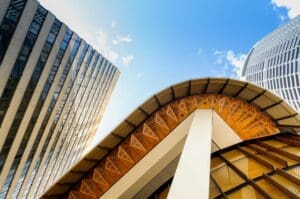Post-Covid, we must build a new income distribution system that will provide society, and every individual, with much greater resilience
By: GUY STANDING
Covid-19 was the trigger for an economic collapse waiting to happen. There will be other triggers. The challenge is to build a new income distribution system that will provide society, and every individual, with much greater resilience.
What has produced the fragility, in Britain and globally, is the evolution of rentier capitalism, in which more and more of the income flows to owners of financial, physical and so-called intellectual property. In the UK, the value of financial corporations’ financial assets has risen to over 1,000 per cent of GDP. Meanwhile, private riches have risen from about 300 per cent of GDP in the 1970s to around 700 per cent today – and wealth inequality dwarfs income inequality, with over 60 per cent of wealth inherited.
It is essential to dismantle rentier capitalism. But that must be done in a way that weakens what I have dubbed the Eight Giants blocking the path to a Good Society for the 21st century. In 1942, in an epoch-defining report, William Beveridge said it was “a time for revolutions, not patching” and that the challenge was to slay Five Giants – Disease, Ignorance, Idleness, Squalor and Want.
We have not defeated those adequately, but the modern Giants are Inequality, Insecurity, Debt, Stress, Precarity, Automation, Extinction and Neo-Fascist Populism. Unless policies weaken their threats, there will be no resilience for next time.
No policy is a panacea. But whatever is proposed must weaken some of those Giants and not exacerbate others.
In a transformational moment, a new income distribution system is needed, because the one on which 20th century economies were based has broken down irretrievably.
The share of income going to labour has declined globally. If we could only recognize that this will persist, we could think more constructively about what to do.
Two changes are essential. We must revive the commons, historically “the poor’s overcoat”. Natural commons belong to us all; social commons are the institutions and services bequeathed to us as commoners, which includes the NHS, social housing, refuges, libraries, parks and so on; civil commons are institutions assuring equal justice; cultural commons are our arts and cultural institutions; knowledge commons are our shared access to information, ideas and education. All were shredded by privatisation, austerity and financialisation in the decades of rentier capitalism. That increased social inequalities and made society more fragile.
Second, a basic income system has moved from being ethically desirable to being also an economic imperative. We should remind ourselves that the resilience of all will depend on the resilience of the most disadvantaged in society.
If every individual had equal basic security, that would be common justice.
Our collective wealth and income are far more due to the efforts of the many generations before us than to anything we do ourselves. If we allow private inheritance of “unearned” wealth, we could interpret a modest equal basic income as social inheritance, a social dividend.
A modest basic income is affordable, and in the longer term could be funded by building a Commons Capital Fund, based on levies or taxes on all incursions into our commons, in which as the Fund grows, through making ecologically sustainable investments, the value of the Common Dividends, or basic incomes, could rise. We are talking about being on a road, not an overnight solution. A basic income system would have many positive effects, reducing the sadness of stress and insecurity, and the life-shortening health problems they induce.
If the Fund were built partly by eco-taxes, such as carbon tax, and led to basic incomes regardless of work status, that would allow all of us to allocate more time to care and ecological work, less to resource-depleting labour in “jobs.” That is just what most of us would wish to do.
__________________________________________________
Guy Standing is a founding member of the Basic Income Earth Network, a non-governmental organisation





















